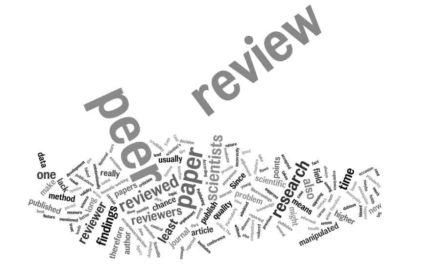The Benefits of Peer Reviewing and Where To Begin
The practice of peer reviewing has suffered a great deal of criticism in recent years with many suggestions for improvements whizzing around the internet at a lightning speed that on occasion allows little time for careful consideration of alternatives and consequences. Certainly, the reviewing system is fraught with difficulties, yet it remains the most effective way in which to ensure the quality of published scholarship. Whatever your area of expertise may be, peer reviewing provides a service for your discipline, for the journals and publishers who disseminate the knowledge generated by that discipline, and for the individual researchers and readers who create and consume that knowledge.
There is, however, a shortage of qualified peer reviewers to meet the current demand, particularly among scholarly journals, so there is no time like the present to begin your efforts to become a peer reviewer. Some journals are attempting to rectify the problem by establishing agreements that require authors who submit their work for review and publication to review, in turn, a certain number of the papers submitted by other researchers in their field. This provides an excellent opportunity to start peer reviewing, but even if the journals to which you submit your writing have no policy of this kind in place, the opportunities to become a peer reviewer are particularly abundant in the current climate.
Journal editors choose the reviewers for the papers they receive, but they tend to choose them from an in-house list of qualified reviewers, and there are a variety of different ways to get your foot in the door. Some journals will allow you to register on their web sites, indicating your specialities and the kinds of papers you would like to review, in order to be included in their database of reviewers. Others may not welcome an unsolicited approach, but it is usually possible to send a letter of interest to the appropriate editor along with your CV and information on your publications, research interests and reviewing experience. Letting your colleagues, mentors, department head, any editors with whom you are acquainted and other members of your research network know that you are interested in peer reviewing is also an excellent idea. Those who do peer reviews themselves may be able to offer valuable advice and even introduce or recommend you to editors who are actively seeking reviewers. Finally, publishing excellent research in your area of expertise will also bring you and your work to the attention of those who may wish to solicit your reviewing skills.
The benefits of peer reviewing are manifold. Reviewers enjoy previews of the newest scholarship, they have the opportunity to reflect on the latest methods, they hone their critical reading and writing skills, they learn how to offer constructive commentary, they help the journals and publishers who disseminate their work, they perform a service for fellow authors and they improve the overall quality of scholarship in their disciplines. Peer reviewing is also a wise career choice and can ultimately earn you not only many new and valuable connections, but even positions on editorial and advisory boards.
You might be interested in Services offered by Proof-Reading-Service.com
Journal Editing
Journal article editing services
PhD Thesis Editing
PhD thesis editing services
Expert Editing
Expert editing for all papers
Medical Editing
Medical Editing Services
Research Editing
Research paper editing services
Book Editing
Professional book editing services

















